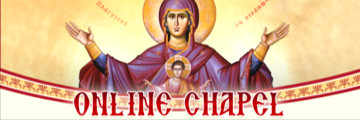
God saves His people through offering us His own life through encounters with one another. His dynamism is brought to perfection through our weakness in spite of our sins and imperfection. This past week several people shared with me words that had been spoken to them which were so important that they have never forgotten them. I am grateful and in wonder over how the words proved to be a “fit” at the time, realizing that this points to the greater mystery of Christ in our midst uniting us.
When it comes to the search for the Pearl of Great Price, the Spirit is an exacting craftsman and the heart is a very particular customer! A “word” proves transformative to the degree that it is an exact “fit” for what the heart is seeking and only the grace of God is capable of knowing and responding to this. St. Gregory Palamas describes the spiritual mystery of dia-Logos at the heart of the sacrament of Confession.
“If it happens that the priest is more perfect in virtue and sends up more ardent prayers, grace passes through him to the one receiving the sacrament, but if the latter is more worthy and prays with greater zeal, God who wants to have mercy—O how inexpressible is his kindness!—does not refuse to give grace through him to the person performing the rite; which is obviously what happened in the case of John [the Baptist], as he testified, saying “Of his fullness have we all received.”(Jn 1.16).[1]
In love and humility, both penitent and confessor are healed by the grace of God passing through them to offer a Word that proves restorative and transforming.
But what if in our encounters, the word we are seeking from Christ is not from a hunger for the pearl of great price, but something far less, something that is incongruent with who Christ is? Jesus reminded his hearers, “The stone the builders rejected has become the cornerstone; the Lord has done this, and it is marvelous in our eyes”? [2] He repeatedly tried to tell his apostles that He would be rejected, shamed and executed. Until the Holy Spirit illumined the eyes of their hearts, they could not comprehend the meaning of the cross and rejected the whole idea of it out of a natural understanding of power and glory. Perhaps like them, we do not comprehend who Jesus is and how He offers us eternal life because we are seeking so much less.
Once when a man in the crowd cried out to Jesus asking, “Teacher, tell my brother to divide the inheritance with me!” Jesus refused and responded instead by asking a very interesting question— one which is addressed to all of us who seek to use him and His Church to acquire what we already have and want without Him. “Man. who made me a judge or executor of your estate? Wake up! Guard yourselves against every form of greed, for a man’s life does not consist in the abundance of his possessions.” [3]
Fr Schmemann captured this mismeeting powerfully when he made the observation
“There is no point in converting people to Christ if they do not convert their vision of the world and of life, since Christ becomes merely a symbol for all that we live and want already—without Him. This kind of Christianity is more terrifying than agnosticism or hedonism.” [4]
In the Gospel reading for this Sunday of St. John Climacus [Mark 9:17-31] we are told that when the unclean spirit saw Jesus, he convulsed the boy. What kind of response is this? He convulsed the boy. He tormented him in response to seeing Jesus! But Jesus is beautiful. He is the perfect “Fit” of the Invisible Uncreated God united with created nature raised up into the perfect human Image and likeness of the Divine Person. Jesus is first born of the dead; the redemption of humankind and all creation. He is the gateway to perfect Communion between God and Creation; the healer of all diseases, the forgiver of sin. He is the perfect fulfillment of the Lord’s Prayer: “Thy Will be done on Earth as it is in Heaven.”
When the unclean spirit saw Jesus he convulsed the boy. Why in the world would anyone seek to injure one whom Jesus loved, in response to seeing the Light of the world standing before him?” [5] It ought to be just the opposite, right? We see Jesus and we are transformed by love and truth.
A soldier fulfilling his duty in the heat of battle had the unusual experience of adrenalized exhilaration while firing upon two insurgents and then seeing their children run out of the house as their parents died from the 50 millimeter canon he had just fired. This sudden juxtaposition of two worlds was a sword of the Spirit that cut him to the depths of his heart. When he returned home some time later and his own children ran in joy to greet him, he avoided their gaze, convulsed with self-hatred in his heart for actions that he could not forgive himself for.
A subtle self-sufficient voice full of pride and merciless expectation of perfection was telling him he was no longer worthy to have those beautiful children. His self-directed rage transformed their bright shining faces of love into an image of himself that caused him to angrily turn his own face away and cast himself into exile and further torment, now for being unable to embrace his own children.
Our response to seeing Jesus is diagnostic of the quality and kind of unclean spirits that torment us. For it is out of the abundance of the heart that the mouth speaks.” [6] Moral injury, accumulated judgments, unforgiveness and unconfessed sins are attacking our spiritual immune system every day seeking to redefine who we are. “We can discern what is seeking to possess and enslave us by how we respond to Jesus and one another. He tells us that “from within come all greed, wickedness, deceit, debauchery, envy, slander, arrogance and foolishness. All these evils come from within and these are what defile a person.” [7]
When we are in the rebellion of sin under the influence of these “unclean spirits” our deepest heart’s desire is buried under mountains of shame and judgments that cause us to avert our gaze and avoid communion. We no longer rush to meet the Lord in our marriages, with our children or in our friendships, clear-eyed with faith, hope and love. Our desire to lay our head at the Lord’s feet in humility, joy and gratefulness and open our hearts to one another in friendship is paralyzed under a mountain of judgments.
Sometimes our defilement is through the shock of experiences like the soldier, but more often it happens slowly over time. Through carelessness, complacency and self-indulgent actions repeated a thousand times, we gradually come under captivity to unclean spirits and grow increasingly insensitive until we find ourselves like the prodigal son in the pig sty craving to be filled with what can only satisfy brute beasts.
In this morning’s reading, after Jesus commands the unclean spirit to release the boy forever, it cries out and convulses the boy again in response to the act of being obedient to Christ’s command. After the unclean spirit leaves the boy, he is described as being like a corpse. [8]
Because of sin we are all dead even though for a time we appear otherwise. The fruit of sin is death. Enslaved to death, we begin to see that its essence is to hate and turn away from the life of communion. Freely chosen vulnerability to truth and love are what characterize life in Christ. This is why Christians firmly resolve to refuse all forms of slavery to anything that dehumanizes and depersonalizes. For Christians, “having dominion over the earth” [9] is interpreted and understood through the total self-offering of God in Christ. It is not power and control over life in order to satisfy selfish appetites, but a dominion of self-offering eucharistic love. The royal priesthood of humanity are the Body of Christ, his Church, illumined by the Holy Spirit and bringing all creation face to face with Him.
Until we are released from the clutch of the unclean spirits that prevail over us, we do not realize how dead we are. When the unclean spirit leaves the boy, he is motionless. He had been kept away from life in Christ since childhood. Gradually, wherever he could have seen Jesus and rejoiced, the unclean spirit blocked this, isolating and starving him from Communion with Life.
We are told that seeing him “like a corpse” Jesus “raises him up.” This is the condition of each of us. After all the unclean spirits have been stripped away from us in death, Jesus will re-member us. He will raise us up as icons of the Resurrection show him pulling Adam and Eve out of the grave by their wrists.
Watchfulness, prayer, confession and the Eucharistic life of the Church help us preserve and grow the Grace given to our hearts in Baptism and give us a foretaste of the Kingdom. The struggle to be faithful to the Christ over the course of our lives is referred to by the Holy Fathers as spiritual warfare and it prepares us for the meeting face to face with Christ after death which will be our judgment.
This Sunday in Lent we commemorate St. John of the Ladder, one of the most experienced and articulate voices regarding what happens in the struggle to respond to Jesus prayerfully in love, again and again in peace, as we pray in the Liturgy, until our last breath. He lived in the 6th and 7th centuries and was Abbot of the St. Catherine Monastery in Egypt. During the Lenten period monasteries listen to readings from St. John Climacus. While his book was written primarily for monastics, it is a much value to us living in the world.
St John catalogues many of the unclean spirits or “vices” and the virtues of grace cultivated by deeper relationship with Christ, using the metaphor of a “ladder” that reaches between heaven and earth like in the dream of Jacob. Our struggle is not with the body itself, as St Paul pointed out, [10] but with the unclean spirits [powers and principalities] that disharmonize and distort our relationship with it.
This distinction can be a confusing process and St John makes a poignant observation regarding the struggle to acquire divine grace so that the will of God is done “on earth as it is in heaven” in our very bodies.
By what rule or manner can I bind this body of mine? By what precedent can I judge him? Before I can bind him he is let loose, before I can condemn him I am reconciled to him, before I can punish him I bow down to him and feel sorry for him. How can I hate him when my nature disposes me to love him. How can I break away from him when I am bound to him forever? How can I escape from him when he is going to rise with me? How can I make him incorrupt when he has received a corruptible nature? How can I argue with him when all the arguments of nature are on his side…If I strike him down I have nothing left by which to acquire virtues. I embrace him. And I turn away from him. What is this mystery in me? [11]
Most importantly, he points us to the heart of the matter that proves decisive in the struggle.
What is the principle of this mixture of body and soul? When nature is overcome, it should be admitted that this is due to Him Who is above nature, since it cannot be denied that the weaker always yields to the stronger….The man who decides to struggle against his flesh and to overcome it by his own efforts is fighting in vain. The truth is that unless the Lord overturns the houses of the flesh and builds the house of the soul, the man wishing to overcome it has watched and fasted for nothing. Offer up to the Lord the weakness of your nature. Admit your incapacity and, without your knowing it, you will find for yourself the gift of chastity. [12]
Apart from the defeats we experience in our spiritual struggle to be faithful to Christ, we would not come to realize how we need the help of the Holy Spirit. Our naïve self-sufficiency renders us unable to truly pray and unwilling to fast from the self-satisfactions that keep us captive to seeking nothing beyond what we imagine we can accomplish on our own.
Admission of the ontological helplessness [13] inherent to our created nature is precisely what the disciples had the most difficulty with when it came to recognizing the path Jesus was taking to save creation and raise us to eternal life in Communion with Him. When the disciples asked Jesus why they were powerless to caste out the unclean spirit, he responded, “This kind can only be caste out by prayer and fasting.” [14] Prayer is the liturgy of the Communion of love with God in Christ and fasting is voluntary obedience in all things that honors that Communion. These are perfectly one in Christ, but not in us. Thus we cry out “I believe, help my unbelief!” [15] so that the Spirit can supply what is lacking in us.
In our blindness we do not realize the significance of our failure to comprehend how God could reveal His infinite love for us through the shame and weakness of Jesus’ voluntary acceptance of the helplessness of the cross and death. Rejection of his willingness to accept helplessness is an indication of our spiritual immaturity and our infection by the unclean spirits who to turn away in revulsion from the thought of God in this vulnerable human condition as being a testimony of divine love.
Wagging our heads under their influence, we wonder like the unrepentant thief on the cross and many of the bystanders, “If you are the Christ, why don’t you eschew this pitiful weakness. If you are truly the Son of God, then do what makes sense to us. Save yourself and us and rise up in power to overcome evil with power and dominate the world for your glory.” This is the advice of demons.
Our Lord conquers death by dying. He re-members us in death and raises us up, removing the stone from our hearts and reviving our flesh with His precious compassion, mercy and long-suffering love. Let us therefore go with him to Jerusalem and remember Him especially in the moments of our losses and defeats, for He cares for us and through the Cross brings joy into the world.
___________________________
[1] Veniamin, C. The Homilies of Saint Gregory Palamas, Pennsylvania: Mount Thabor Publishing, p. 498.
[2] Mt. 21:42.
[3] Luke 12:13-15.
[4] Alexander Schmemann, The Journals of Father Alexander Schmemann 1973-1983 trans. Juliana Schmemann, Crestwood, NY: St. Vladimir’s Seminary Press, 2002, p. 17.
[5] Jn 8:12.
[6]Luke 6:45
[7]Mk 7:22.
[8] Mark 9:26.
[9] Ge. 1:28.
[10] Eph. 6:12.
[11] St John Climacus, New York: Paulist Press, Step 15.
[12] Ibid.
[13] Ontological helplessness is distinct from psychological in the same way as ontological humility is distinct from psychological masochism. Psychologically we need to be vital and healthy to deal with daily affairs of our lives. But when it comes to being able to overcome the ontological condition of our mortality and to be united with divine grace, psychology is insufficient. We are raised from “above” by Christ, not from below by our own strength.
[14] Mk. 9:29.
[15] Mk. 9:24.



